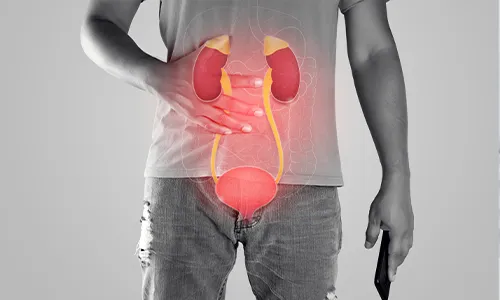Uro-oncology is a specialized field of medicine focused on diagnosing and treating cancers that affect the urinary system and the male reproductive organs. These cancers include prostate cancer, kidney cancer, bladder cancer, and testicular cancer. As these cancers often show subtle symptoms in their early stages, timely detection and treatment are crucial for successful outcomes.
Types of Urological Cancers
1. Prostate Cancer
Prostate cancer is one of the most common cancers in men, especially those over the age of 50. Unlike Benign Prostatic Hyperplasia (BPH), which is a non-cancerous enlargement of the prostate, prostate cancer occurs when abnormal cells grow uncontrollably within the prostate gland. Early detection through routine screening like PSA tests is key to managing prostate cancer
Symptoms:
- Frequent urination
- Difficulty urinating
- Blood in urine or semen
- Pelvic pain or discomfort
Treatment Options: Depending on the stage of the cancer, treatment options may include surgery (prostatectomy), radiation therapy, hormone therapy, or targeted therapies. Minimally invasive robotic surgeries are also increasingly popular due to faster recovery times and fewer complications.
2. Kidney Cancer
Kidney cancer, also known as renal cancer, often develops silently with no obvious symptoms until it reaches an advanced stage. The most common type is renal cell carcinoma, which originates in the lining of the small tubes in the kidney.
Symptoms:
- Blood in the urine
- Persistent back or side pain
- Unexplained weight loss
- Fatigue
Treatment Options: Treatment for kidney cancer often involves surgical removal of part or all of the kidney (nephrectomy). Minimally invasive laparoscopic or robotic surgeries are preferred. In certain cases, targeted therapies or immunotherapies may be recommended, especially for advanced or metastatic cancer.
3.
Bladder cancer typically begins in the cells lining the inside of the bladder. It is often detected early, which makes it one of the more treatable cancers when caught at an early stage. However, it also has a high recurrence rate.
Symptoms:
- Blood in the urine (often painless)
- Frequent or painful urination
- Pelvic pain
Treatment Options: Bladder cancer treatment may involve surgery to remove tumors, chemotherapy, or immunotherapy to prevent recurrence. In more advanced cases, a radical cystectomy (removal of the bladder) may be necessary, often followed by reconstructive surgery to create a new way for urine to exit the body.
4. Testicular Cancer
Testicular cancer is most commonly found in younger men, typically between the ages of 15 and 35. While it is one of the most treatable forms of cancer, early detection is crucial for the best outcomes.
Symptoms:
- A lump or swelling in one of the testicles
- A feeling of heaviness in the scrotum
- Pain or discomfort in the testicle or scrotum
Treatment Options: Surgery to remove the affected testicle (orchidectomy) is often the first step in treatment. Additional treatments such as chemotherapy or radiation may be needed, depending on whether the cancer has spread.
Why Early Detection is Key
Many urological cancers, such as prostate and bladder cancer, can be managed more effectively when caught early. Routine screenings, such as prostate-specific antigen (PSA) tests for prostate cancer or urine cytology tests for bladder cancer, can help detect cancer at a stage when treatment is most likely to be successful.
Treatment Approaches in Uro-Oncology
Surgical Intervention
Minimally invasive surgeries, such as robotic-assisted surgery, allow for precise removal of tumors with reduced recovery times. Radical surgeries, such as cystectomy (for bladder cancer) or nephrectomy (for kidney cancer), may be necessary in more advanced cases.
Radiation Therapy
This is often used in prostate and bladder cancers to target cancer cells while preserving as much healthy tissue as possible.
Chemotherapy
Chemotherapy is frequently used in bladder cancer and testicular cancer, especially if the cancer has spread beyond the original site.
Immunotherapy and Targeted Therapy
These newer therapies are increasingly used to treat advanced urological cancers. They work by boosting the body’s immune response or targeting specific molecules involved in cancer growth.
Comprehensive Uro-Oncology Care in Dubai
For patients in Dubai, Dr. Anurag Kumar offers expert care in the diagnosis and treatment of urological cancers. With experience in both traditional and minimally invasive surgeries, Dr. Kumar focuses on delivering patient-centered care with a focus on long-term outcomes. His expertise in robotic surgery and advanced treatment options provides patients with the most up-to-date, effective care.
If you are concerned about urological symptoms or are seeking treatment options for prostate, kidney, bladder, or testicular cancer, Dr. Kumar can provide comprehensive guidance and support.
Final Thoughts
Early detection and specialized care are critical to managing urological cancers effectively. Routine screenings and timely consultations with a urologist can lead to better outcomes, helping patients maintain their quality of life. Whether you need advanced surgical interventions or non-invasive treatments, Dr. Anurag Kumar is available to guide you through your treatment options with a compassionate and evidence-based approach.
For more information or to schedule a consultation, contact Dr. Anurag Kumar at +971 58 167 4006 or email kumarannurag@gmail.com. For patients in India, online consultations are available at +918920165762.

